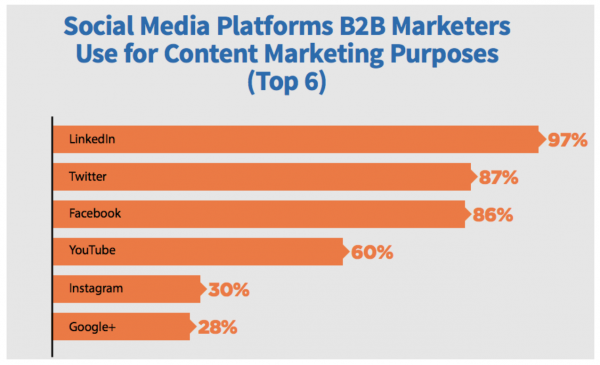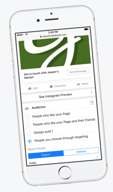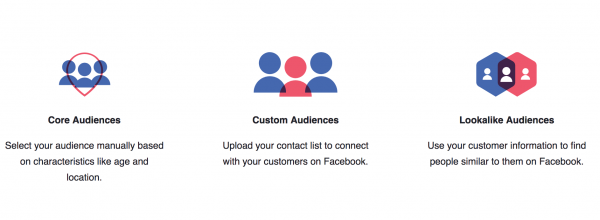
B2B companies often wonder which, if any, social media channels to use for lead generation and awareness. Facebook, the network once solely used to connect with friends and family, often comes into question as to whether or not it’s a useful tool for B2B businesses to communicate with prospects. Facebook also recently changed its algorithm. Now the social giant will favor friend and family content over brand content, making B2B marketers wonder: Is Facebook worth using in a marketing campaign?
Before answering that, it’s important to note that there are a few ways B2B marketers can use Facebook. First, CEOs and Founders can leverage personal Facebook profiles. Second, there are “Groups” for organizations, clubs, and topics. Third, there are “Pages” for brands, companies, and notable people.
Most importantly, Facebook has targeting and advertising solutions that are highly useful for B2B marketers, and the platform is often underlooked for B2B, which means less competition.
The Facebook market is big:
There are a lot of people that use this social network. 79% of all online US adults use Facebook (BI Intelligence), and 76% of Facebook users check it every day (Pew Research Center). These statistics show that there is a dedicated group that sticks to Facebook as a social network of choice, but can B2B organizations reach them there and turn them into leads?

According to The Content Marketing Institute’s recent survey, 86% of B2B marketers use Facebook for content marketing purposes. Last year, Facebook was the number two spot, but this year Twitter took a narrow edge over Facebook.
B2B marketers use Facebook to share company content and attract engagement on the social site. But is it effective? Surprisingly, while so many B2B marketers use Facebook, not that many think it’s actually useful. According to the same study, only 38% of B2B marketers say Facebook is effective for B2B marketing.
For those B2B companies that want to forge ahead with Facebook as a marketing tool, use the social network wisely. It should not be on the only social network used, and marketers should probably not make it a priority unless data shows otherwise. Here are ways to use the site for B2B marketing.
Do not use Facebook for pitching sales-y or purely bottom-of-the-funnel content. We have seen the best performance using content or stories that relate to top-of-the-funnel (awareness) type content or remarketing to existing audiences using carry-on themes with interesting perspectives.
Using a tool such as Shortstack or Tabsite, add a sign-up page to your Facebook brand page. When buyers arrive on your Facebook page, they can then sign up for a newsletter, download your eBook, etc. Most importantly, they leave their email, which means they will be new additions to your sales funnel and increase your lead pool.
Buyers are often going to social media to talk to businesses, but they also want to engage with socially responsible brands. B2B companies can use Facebook as a way to speak directly to prospects about their positive footprint or advancements in deepening the customer experience. These types of stories allow clients to form a deeper and more resonant understanding of the brand's culture. Certainly, experience service can also play a role here to connect with clients to offer advice and answer any questions about the offering or the industry opportunities. This means real-time answers for the buyer and happy clients for the business as well as a more positive view of the corporation's beneficial footprint.
Facebook can also be a way to showcase expertise in your field. Share blog posts and articles by the company or company’s founders to illustrate how knowledgeable you all are on the buyer’s pain points. Since often buyers might look around on social media for answers to their questions, it’s good to have this content on your Facebook page.
Facebook is a top-of-the-funnel B2B marketing tactic, which means content should focus on educating the prospect on their problem. Content should not be sales-focused or try to sell the prospect on the product; they are not in that stage just yet.
Create a new video tab on your Facebook page to load all of your product’s how-to tutorial videos. Make sure to clearly label each one so that buyers know what is what. You can put teaser videos, explainer videos, or instructional videos. Facebook can house some evergreen content like these videos, so when someone searches your company, they quickly find a video answer.
 Facebook is not a good platform for organic (non-paid) content efforts. For B2B marketing, paid campaigns provide all the value.
Facebook is not a good platform for organic (non-paid) content efforts. For B2B marketing, paid campaigns provide all the value.
We suggest using your ideal buyer profiles and personas to build target audiences or upload contacts using email addresses as unique identifiers to create a target audience group. Facebook can become another channel to share content and deepen the buyer's journey for B2B organizations.

Best practices:
Facebook might not be worth your B2B organization’s time, but only data can tell whether or not that is true. Using Google Analytics, measure to find out whether or not Facebook increases the lead pool and what happens to those leads. Are they converted in the sales funnel? Do any become clients? Working with the sales team, follow along the journey of all Facebook leads to find out whether or not it’s worth continually posting on Facebook.
Sources
by Jonathan Franchell, CEO of Ironpaper - For more tips and hacks: Need to remove a new line after h1 tags? Both web designers and SEO practitioners need to employ headline tags: H1, H2, H3 in several ways to improve web page structure and tag...

The Crowded Arena of the IT Marketplace Updated December 2024 The Information Technology (IT) landscape is experiencing rapid growth and intensifying competition. IT spending is projected to reach nearly 5.1 trillion U.S. dollars in 2024, a...

Updated December, 2024 The field of digital marketing is evolving rapidly in response to new technology and changing buyer expectations. To help career-minded marketers, we’ve rounded up the top 10 skills needed to succeed in the field. These are...

The marketing industry is transforming significantly due to generative AI and increasing market complexity. Gartner's prediction of a 25% decline in traditional search traffic suggests that the era of search engines is dying. AI tools, particularly...
